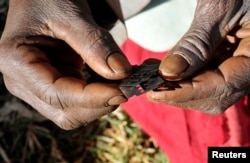United Nations and human rights organizations are calling for a complete stop to the harmful practice of female genital mutilation, which affects millions of women and girls worldwide. The call for a global ban comes as the world commemorates Saturday the International Day of Zero Tolerance for Female Genital Mutilation.
Women and girls have been subjected to female genital mutilation for millennia, with the earliest recorded excisions having been performed on Egyptian girls in 25 BC. Indeed, Egypt in the 21st century remains one of the countries where FGM is most frequently performed.
A recent report by the U.N. Children’s Fund, UNICEF, finds at least 200 million girls and women alive today have undergone female genital mutilation in 30 countries. The study notes half of these so-called "cuttings" have occurred in three countries — Egypt, Ethiopia, and Indonesia.
Human rights issue
FGM is widely practiced in countries in Africa and the Middle East. Tarek Jasarevic, spokesman for the World Health Organization, says the procedure involves partial or total removal of the external female genitalia or other injury to the female genital organs. He says there is no medical reason for this intervention.
“It is a violation of the human rights of girls and women and has no health benefits. It harms girls and women in many ways… FGM is mostly carried out on young girls sometimes between infancy and age 15,” Jasarevic said.
FGM can cause severe bleeding, problems urinating, infections, as well as complications in childbirth and increased risk of newborn deaths. Some women and girls subjected to this procedure die. Many of those who survive suffer severe psychological consequences.
Limited progress
There are cultural and social factors for performing FGM. A commonly cited reason is the need to prepare girls for adulthood and marriage by reducing their sexual desire to maintain their virginity before marriage and fidelity during marriage. There is no religious basis for this practice.
Human rights expert Benyam Mezmur tells VOA a growing number of countries are passing laws criminalizing FGM, but their impact is limited.
“Even though in the presence of laws, in some instance they are not explicit, in some instance even when they are explicit, they are not enforced — and again, traditional leaders, religious leaders also have a role to play,” he said.
U.N. agencies warn the overall rate of progress toward ending FGM is not enough to keep up with population growth. They say the number of girls and women subjected to this barbaric practice will increase significantly over the next 15 years if current trends continue.






